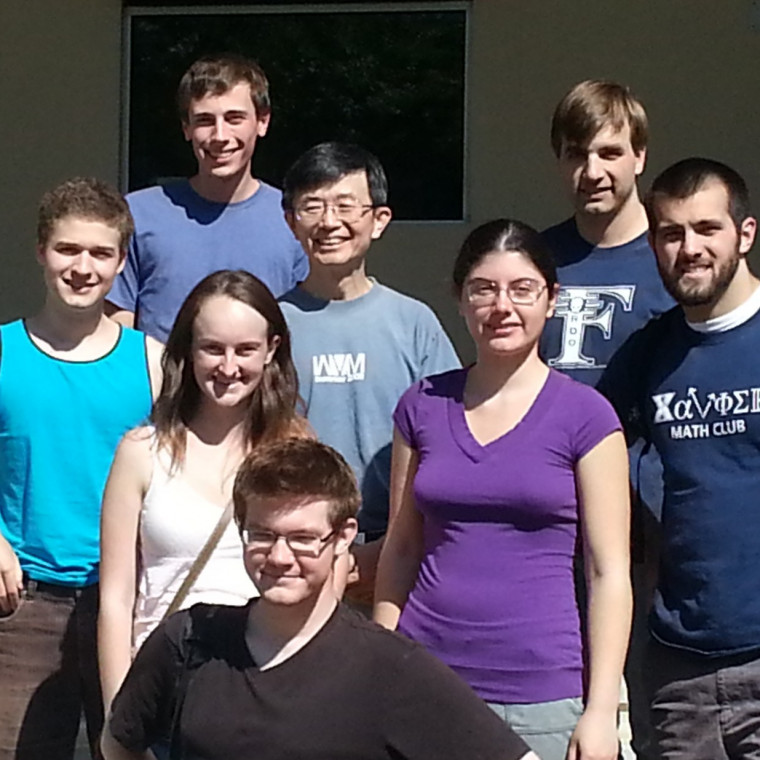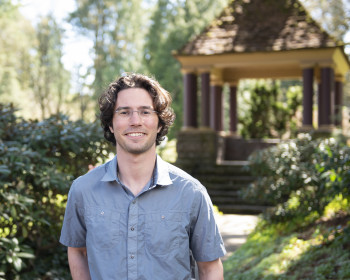Students’ summer research uses gaming to create smarter computers
Open gallery

During the summer, Lewis & Clark students continue to work hard in their fields of study. By collaborating with faculty on research projects, students are able to engage their curiosity, expand their learning, and prepare for life after college, all while making meaningful contributions to scholarship.
Brandon Cieslak ’15, Samuel Kelly ’14, Sam Levenick ’15, and Rosemary Anderson High School student Kal Johnson are working alongside Associate Professor of Computer Science Peter Drake and Associate Professor of Mathematics Yung-Pin Chen to develop an artificially intelligent program to play the board game Go. Developed thousands of years ago in China, Go is a strategy game that artificial intelligence has so far been unable to master. In the following Q&A, the team members reflect on their experience.
Does your research have any potential applications in the real world, or will it influence other work in your field?
Drake: Our team’s work has been cited internationally by other computer Go researchers. Go is an interesting problem simply because it is unsolved; it is considered a “grand challenge” problem in artificial intelligence. While humans no longer stand a chance against computers at chess, even supercomputers can’t yet beat human Go players. More practically, Go stands as a model for complex decision making. Techniques developed in creating strong Go players could be applied to a wide variety of other problems, including designing transportation networks, power plants, and microprocessors.
What first sparked your interest in this research area?
Cieslak: I was just getting started in computer science. It was a really interesting concept for me to work in a larger group because that was not something I’d experienced before. I felt I could benefit from seeing others’ styles of writing code. I often learned most when I saw my professor’s changes to my code, and being able to do this in a group would likely improve my skills considerably.
Kelly: When I learned that computers aren’t good at playing Go, in spite of the simple rules, I was intrigued. I love solving puzzles and using computers to help, so I figured trying to make a strong Go-playing program would be a lot of fun. So far, it is a lot of fun, especially getting to work with a group of smart people and putting our heads together.
How has working closely with faculty influenced your education?
Johnson: It makes me realize school is very important and that you should always put time and effort into your work, even outside of school. I notice how committed they are and how hard they work to produce important information.
Kelly: Having more control over my education as well as knowing that someone has placed confidence in me motivates me to work harder and delve deeper. As a result, I am getting better at figuring things out and asking good questions.
How do you hope your experiences this summer will impact your future studies or professional pursuits?
Levenick: I think that this summer I’m learning how to work with a team on a project that is way too large for me to do by myself. I have to coordinate with the other members of my team to get things done.
Cieslak: Coordination between different members of the team and ensuring that our code works in tandem to improve the program is something that I have not been able to experience in any other programming environment, and it is something I will encounter much more in the future. Learning how to work as a part of the team is an invaluable experience.
Kelly: I plan on going into software development, where working well as a team is vital. I am learning skills and tools to help with this. And I hope to be a stronger programmer by the end of our project.
Anything else you’d care to add?
Chen: When you see our group playing Go, we are not slacking off! In fact, we are gathering some important domain-specific knowledge.
About the program
The John S. Rogers Science Research Program allows students to participate in graduate-level research with an emphasis on strengthening their communication skills by requiring them to present their findings. This summer, 40 students are pursuing topics that range from artificial intelligence and motivating behavior to holographic tweezers and zebra fish. Working closely with peers and faculty members, students undertake research questions and present their work in two public venues.
“We’re not asking you, ‘What’s the answer?’ We’re saying, ‘What’s the question?’” said Michael Broide, director of the Rogers program and chair of the physics department. “I think what sets our program apart is that regardless of what project you are on, we’re all going to come together as a group to present what we’re doing in as accessible a way as possible. In science, it’s such an important skill to be able to explain cogently what you’re doing.”
Students make their final research presentation at the Rogers summer science poster session, held in conjunction with the Science Without Limits Symposium. Scheduled for September 18, the poster session is free and open to the public.
Rogers Summer Research Projects
Zibby Pillote ’14 contributed to this story.
More Newsroom Stories
Public Relations is located in McAfee on the Undergraduate Campus.
MSC: 19
email public@lclark.edu
voice 503-768-7970
Public Relations
Lewis & Clark
615 S. Palatine Hill Road MSC 19
Portland OR 97219

